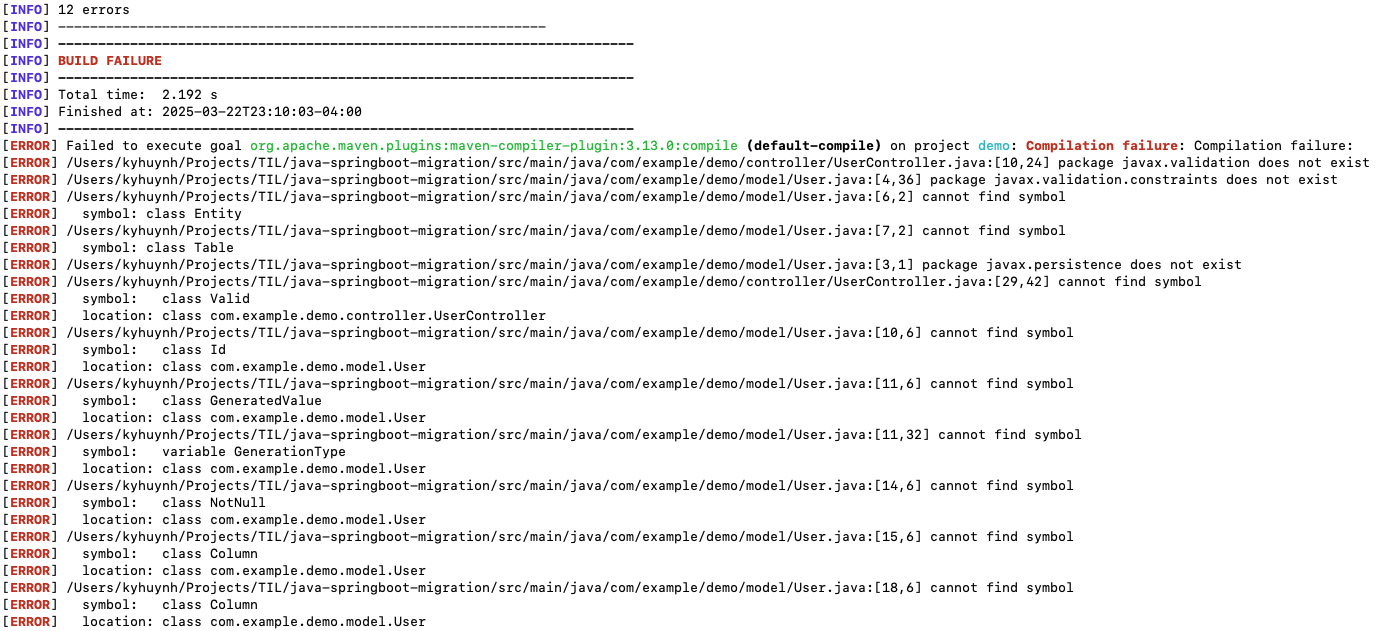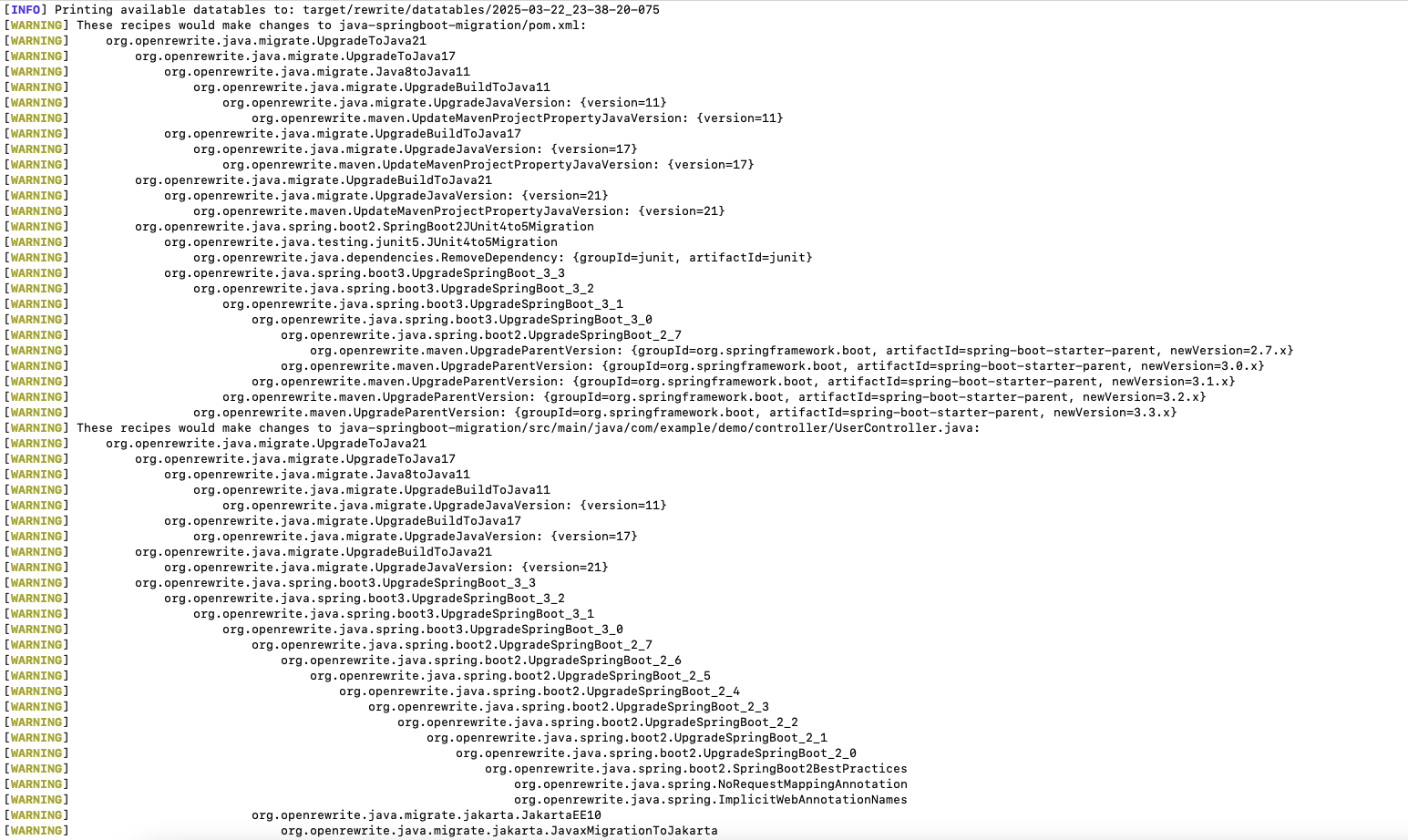Simplify Java and SpringBoot migration with OpenRewrite
Challenges of Migration
With older versions like Spring Boot 2.x reaching end-of-life and no longer receiving support, migrating to newer versions is essential for security, compatibility, and performance improvements. However, the migration process comes with several challenges:
1. Breaking Changes: Major version upgrades often introduce breaking changes. For example, Spring Boot 3.x requires Java 17 and migrates from javax.* to jakarta.* packages.
2. Deprecated APIs: Many commonly used APIs and patterns become deprecated and require replacements.
3. Manual Updates: Traditional migration requires manually updating dependencies, refactoring code, and fixing compatibility issues.
4. Time-Consuming: Large codebases may take weeks or months to migrate, increasing project costs and risks.
5. Testing Burden: Every change must be thoroughly tested to ensure functionality remains intact.
So, how can we simplify and accelerate the migration process? This is where OpenRewrite comes in handy.
OpenRewrite
OpenRewrite is an open-source tool for automated code refactoring, helping developers reduce technical debt. It provides prebuilt refactoring recipes for framework migrations, security fixes, and code styling, cutting down effort from hours to minutes.
Plugins for Gradle and Maven make it easy to apply these changes to repositories. Originally focused on Java, the OpenRewrite community is actively expanding support for more languages and frameworks.
Key Features
- Automated Refactoring: Automatically updates code syntax, dependencies, and patterns
- Recipe-based: Uses declarative recipes to define transformation rules
- Style Preservation: Maintains original code formatting and comments
- Large-Scale Changes: Can process entire codebases consistently
- Extensible: Supports custom recipes for specific migration needs
How does it work?
OpenRewrite modifies Lossless Semantic Trees (LSTs), which represent your source code, and converts them back into source code.
You can review the changes and commit them as needed.
Modifications are made using Visitors, which are grouped into Recipes.
Recipes ensure changes are minimally invasive and maintain the original formatting.
Practice
In this post, I’ll demonstrate how to migrate a simple CRUD Spring Boot application built with Java 8, Spring Boot 2.x, and JUnit 4 to Java 21, Spring Boot 3.3, and JUnit 5 using OpenRewrite.
Codebase
Checkout here: GitHub
1) pom.xml
1
2
3
4
5
6
7
8
9
10
11
12
13
14
15
16
17
18
19
20
21
22
23
24
25
26
27
28
29
30
31
32
33
34
35
36
<?xml version="1.0" encoding="UTF-8"?>
<project xmlns="http://maven.apache.org/POM/4.0.0"
xmlns:xsi="http://www.w3.org/2001/XMLSchema-instance"
xsi:schemaLocation="http://maven.apache.org/POM/4.0.0 https://maven.apache.org/xsd/maven-4.0.0.xsd">
<modelVersion>4.0.0</modelVersion>
<parent>
<groupId>org.springframework.boot</groupId>
<artifactId>spring-boot-starter-parent</artifactId>
<version>2.7.14</version>
<relativePath/>
</parent>
<groupId>com.example</groupId>
<artifactId>demo</artifactId>
<version>0.0.1-SNAPSHOT</version>
<name>demo</name>
<description>Demo project for Spring Boot Migration</description>
<properties>
<java.version>1.8</java.version>
</properties>
<dependencies>
// dependencies: starter web, data-jpa, etc
</dependencies>
<build>
<plugins>
<plugin>
<groupId>org.springframework.boot</groupId>
<artifactId>spring-boot-maven-plugin</artifactId>
</plugin>
</plugins>
</build>
</project>
2) UserController.java
1
2
3
4
5
6
7
8
9
10
11
12
13
14
15
16
17
18
19
20
21
22
23
24
25
26
27
28
29
30
31
32
33
34
@RestController
@RequestMapping("/api/users")
public class UserController {
@Autowired
private UserRepository userRepository;
@Autowired
private UserService userService;
@RequestMapping(method = RequestMethod.GET)
public List<User> getAllUsers() {
return userRepository.findAll();
}
@RequestMapping(method = RequestMethod.POST)
public ResponseEntity<?> createUser(@Valid @RequestBody User user) {
User savedUser = userRepository.save(user);
return ResponseEntity.ok().build();
}
@RequestMapping(value = "/{id}", method = RequestMethod.GET)
public ResponseEntity<User> getUserById(@PathVariable("id") Long id) {
User user = userRepository.findById(id).orElse(null);
return user != null ? ResponseEntity.ok(user) : ResponseEntity.notFound().build();
}
@RequestMapping(value = "/username")
public ResponseEntity<User> getUserByUsername(@RequestParam String username) {
User user = userService.findByUsername(username);
return user != null ? ResponseEntity.ok(user) : ResponseEntity.notFound().build();
}
}
3) UserService.java
1
2
3
4
5
6
7
8
9
10
@Service
public class UserService {
@Autowired
private UserRepository userRepository;
public User findByUsername(String username) {
return userRepository.findByUsernameNative(username);
}
}
4) UserRepository.java
1
2
3
4
5
6
7
@Repository
public interface UserRepository extends JpaRepository<User, Long> {
@Query(value = "SELECT * FROM users WHERE username = ?1", nativeQuery = true)
User findByUsernameNative(String username);
}
5) User.java
1
2
3
4
5
6
7
8
9
10
11
12
13
14
15
16
17
18
19
20
import javax.persistence.*;
import javax.validation.constraints.NotNull;
@Entity
@Table(name = "users")
public class User {
@Id
@GeneratedValue(strategy = GenerationType.AUTO)
private Long id;
@NotNull
@Column(nullable = false)
private String username;
@Column
private String email;
// setter, getter
}
6) UserControllerTest.java
1
2
3
4
5
6
7
8
9
10
11
12
13
14
15
16
17
18
19
20
21
22
23
24
25
26
27
28
29
30
31
32
33
34
35
36
37
38
@RunWith(SpringRunner.class)
@SpringBootTest
@AutoConfigureMockMvc
public class UserControllerTest {
@Autowired
private MockMvc mockMvc;
@Autowired
private UserRepository userRepository;
@Before
public void setup() {
userRepository.deleteAll();
}
@Test
public void testCreateUser() throws Exception {
String userJson = "{\"username\":\"testuser\",\"email\":\"test@example.com\"}";
mockMvc.perform(MockMvcRequestBuilders.post("/api/users")
.contentType(MediaType.APPLICATION_JSON)
.content(userJson))
.andExpect(MockMvcResultMatchers.status().isOk());
}
@Test
public void testGetUser() throws Exception {
User user = new User();
user.setUsername("testuser");
user.setEmail("test@example.com");
userRepository.save(user);
mockMvc.perform(MockMvcRequestBuilders.get("/api/users/" + user.getId()))
.andExpect(MockMvcResultMatchers.status().isOk())
.andExpect(MockMvcResultMatchers.jsonPath("$.username").value("testuser"));
}
}
Manually migration
Before using OpenRewrite, let’s see what happens if we manually migrate to Java 21 and Spring Boot 3.3.
First, update pom.xml
1
2
3
4
5
6
7
8
9
10
<parent>
<groupId>org.springframework.boot</groupId>
<artifactId>spring-boot-starter-parent</artifactId>
<version>3.3.10</version>
<relativePath/>
</parent>
<properties>
<java.version>21</java.version>
</properties>
Next, clean and build the project using Maven: mvn clean install
There are several compilation errors
Okay, let’s revert the changes and migrate using OpenRewrite.
Migration with OpenRewrite
Add OpenRewrite plugin
In pom.xml, add the OpenRewrite Maven plugin. If you’re using Gradle, you can add the Gradle plugin.
1
2
3
4
5
6
7
8
9
<build>
<plugins>
<plugin>
<groupId>org.openrewrite.maven</groupId>
<artifactId>rewrite-maven-plugin</artifactId>
<version>6.3.2</version>
</plugin>
</plugins>
</build>
Choose the Recipe for migration
To discover all the available recipes, you can check the Recipe catalog, which lists all the available recipes, including: Java, Spring Boot, Hibernate, Quarkus, Scala, .NET, Jenkins, etc.
In this showcase, I will use three recipes: Java 8 to 21, Spring 2 to 3, and JUnit 4 to 5.
Let’s add the recipes to the pom.xml; each recipe has its own dependency.
1
2
3
4
5
6
7
8
9
10
11
12
13
14
15
16
17
18
19
20
21
22
23
24
25
<plugin>
<groupId>org.openrewrite.maven</groupId>
<artifactId>rewrite-maven-plugin</artifactId>
<version>6.3.2</version>
<configuration>
<exportDatatables>true</exportDatatables>
<activeRecipes>
<recipe>org.openrewrite.java.migrate.UpgradeToJava21</recipe>
<recipe>org.openrewrite.java.spring.boot2.SpringBoot2JUnit4to5Migration</recipe>
<recipe>org.openrewrite.java.spring.boot3.UpgradeSpringBoot_3_3</recipe>
</activeRecipes>
</configuration>
<dependencies>
<dependency>
<groupId>org.openrewrite.recipe</groupId>
<artifactId>rewrite-migrate-java</artifactId>
<version>3.4.0</version>
</dependency>
<dependency>
<groupId>org.openrewrite.recipe</groupId>
<artifactId>rewrite-spring</artifactId>
<version>6.3.0</version>
</dependency>
</dependencies>
</plugin>
Now, run Maven to install the OpenRewrite plugin and its recipes:
mvn clean install
Preview Migration
OpenRewrite provides the dryRun mode, which allows developers to preview the changes before actually applying them by using:
mvn rewrite:dryRun
You can see the changes that will be used for the actual migration.
Apply the migration
Now, let’s do the migration
mvn rewrite:run
Use your IDE or a diff checker tool to review the changes.
1. Update pom.xml: It automatically update the SpringBoot version to 3.3.10 and Java to 21, remove JUnit4. 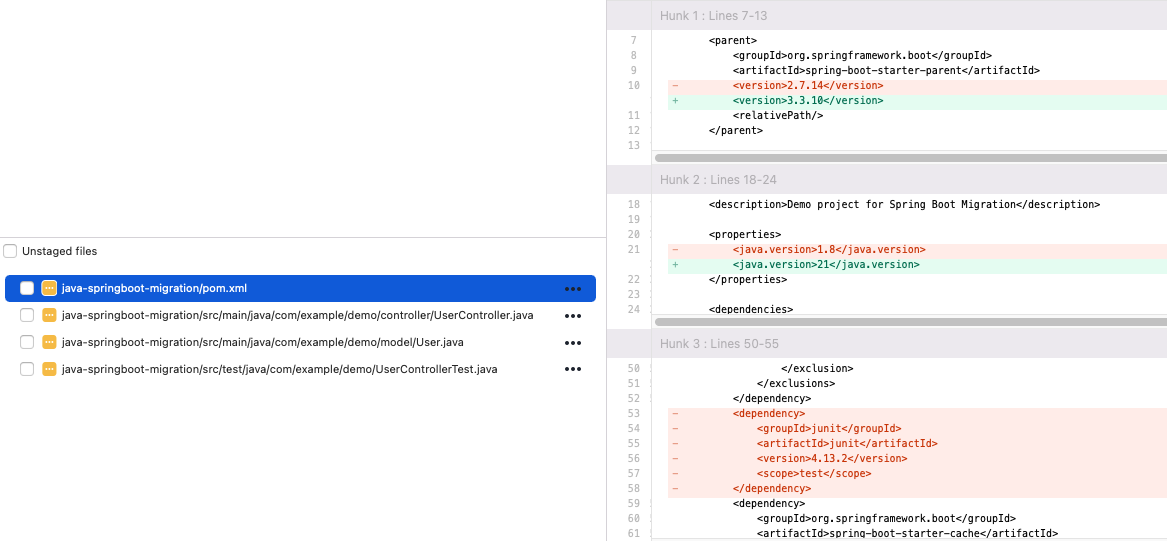
2. Update Controller: Migrates from javax.* to jakarta.* packages, changing to use @GetMapping, @PostMapping for dedicated annotations. 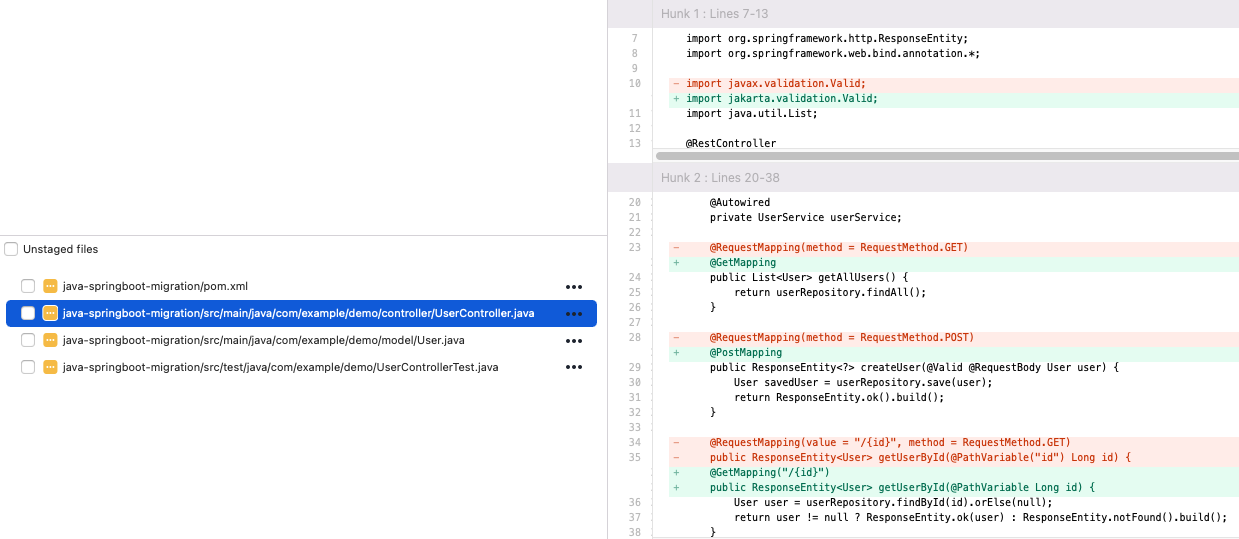
3. Update Unit Test: Replace @Before by @BeforeEach, update package name 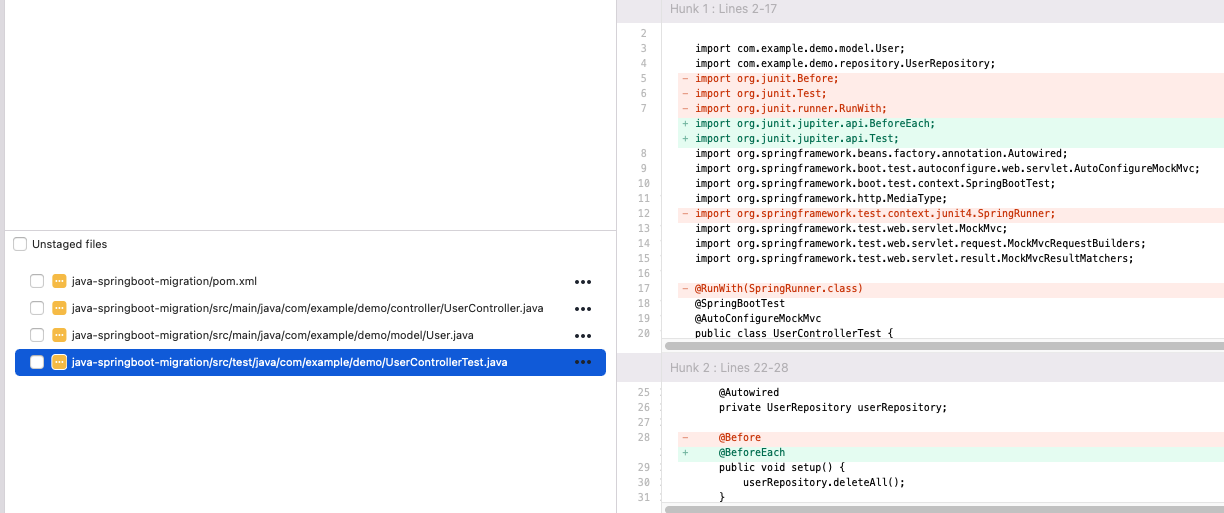
Limitations
In this showcase, OpenRewrite successfully migrates to Java 21 and Spring Boot 3.3, but it still has some limitations. Since OpenRewrite relies on predefined recipes, it supports many common frameworks but not all of them.
For example, if you need to migrate a third-party library like Ehcache2 to Ehcache3 (which is no longer supported in Spring 3.0), OpenRewrite does not provide a built-in recipe. In such cases, you must either write a custom recipe or perform the migration manually.
If you create a custom recipe, consider contributing it to the OpenRewrite community to help others with similar migrations.
Summary
OpenRewrite significantly simplifies the Java and Spring Boot migration process by:
- Automating repetitive code changes
- Reducing migration time and effort
- Minimizing human errors
- Standardizing the migration approach
While OpenRewrite doesn’t eliminate the need for testing and validation, it reduces the manual effort required for migrations. This allows developers to focus on more complex migration aspects and business logic updates.
References
- https://docs.openrewrite.org/
- https://github.com/openrewrite

